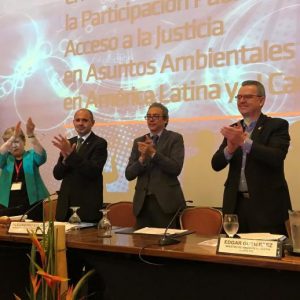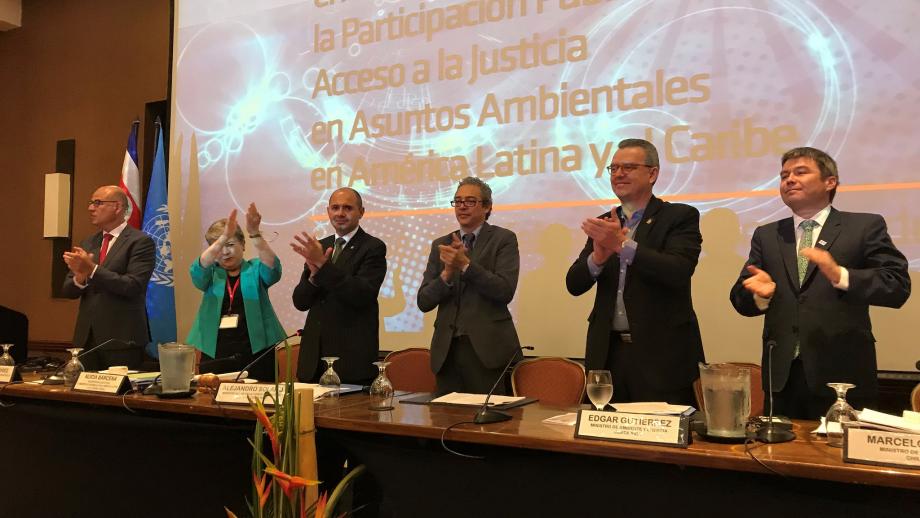[:en] On 4 March 2018, in Escazú, Costa Rica, the Regional Agreement on Access to Information, Public Participation and Access to Justice in Environmental Matters in Latin America and the Caribbean has been adopted by representatives from 24 countries. Signed at present by 15 States (Antigua and Barbuda, Argentina, Brazil, Costa Rica, Ecuador, Guatemala, Guyana, Haiti, Mexico, Panama, Peru, The Republic Dominican Republic, Saint Lucia and Uruguay), the agreement is open for signature at United Nations Headquarters in New York from 27 September 2018 to 26 September 2020 by the 33 countries of Latin America and the Caribbean contained in Annex 1 of the Agreement and, in accordance with Article 22, paragraph 1, shall enter into force on the ninetieth day after the date of deposit of the eleventh instrument of ratification, acceptance, approval or membership.
On 4 March 2018, in Escazú, Costa Rica, the Regional Agreement on Access to Information, Public Participation and Access to Justice in Environmental Matters in Latin America and the Caribbean has been adopted by representatives from 24 countries. Signed at present by 15 States (Antigua and Barbuda, Argentina, Brazil, Costa Rica, Ecuador, Guatemala, Guyana, Haiti, Mexico, Panama, Peru, The Republic Dominican Republic, Saint Lucia and Uruguay), the agreement is open for signature at United Nations Headquarters in New York from 27 September 2018 to 26 September 2020 by the 33 countries of Latin America and the Caribbean contained in Annex 1 of the Agreement and, in accordance with Article 22, paragraph 1, shall enter into force on the ninetieth day after the date of deposit of the eleventh instrument of ratification, acceptance, approval or membership.
Twenty years after the Aarhus Convention on Access to Information, public participation in decision-making and access to justice in environmental matters signed by the member states of the Economic Commission for Europe as well as States with consultative status within it, the Escazú Convention appears as the second treaty to implement Principle 10 of the Rio Declaration on Environment and Development. We welcome this new step towards environmental democracy, hoping that it will be accompanied by adequate mechanisms for its effectiveness.
Download english-spanish pdf[:fr] Le 4 mars 2018 à été adopté, à Escazú, Costa Rica, l’accord régional sur l’accès à l’information, la participation du public et l’accès à la justice en matières environnementales en Amérique latine et dans les Caraïbes par les représentants de 24 pays. Signé à l’heure actuelle par 15 Etats (Antigua-et-Barbuda, l’Argentine, le Brésil, le Costa Rica, l’Équateur, le Guatemala, le Guyana, Haïti, le Mexique, le Panama, le Pérou, La République dominicaine, Sainte-Lucie et l’Uruguay), l’accord est ouvert à la signature au Siège de l’Organisation des Nations Unies à New York du 27 septembre 2018 au 26 septembre 2020 par les 33 pays d’Amérique latine et des Caraïbes figurant à l’annexe 1 de l’Accord et, conformément au paragraphe 1 de l’article 22, il rentrera en vigueur le quatre-vingt-dixième jour après la date du dépôt du onzième instrument de ratification, d’acceptation, d’approbation ou d’adhésion.
Le 4 mars 2018 à été adopté, à Escazú, Costa Rica, l’accord régional sur l’accès à l’information, la participation du public et l’accès à la justice en matières environnementales en Amérique latine et dans les Caraïbes par les représentants de 24 pays. Signé à l’heure actuelle par 15 Etats (Antigua-et-Barbuda, l’Argentine, le Brésil, le Costa Rica, l’Équateur, le Guatemala, le Guyana, Haïti, le Mexique, le Panama, le Pérou, La République dominicaine, Sainte-Lucie et l’Uruguay), l’accord est ouvert à la signature au Siège de l’Organisation des Nations Unies à New York du 27 septembre 2018 au 26 septembre 2020 par les 33 pays d’Amérique latine et des Caraïbes figurant à l’annexe 1 de l’Accord et, conformément au paragraphe 1 de l’article 22, il rentrera en vigueur le quatre-vingt-dixième jour après la date du dépôt du onzième instrument de ratification, d’acceptation, d’approbation ou d’adhésion.
Vingt ans après la Convention d’Aarhus sur l’accès à l’information, la participation du public au processus décisionnel et l’accès à la justice en matière d’environnement signée par les États membres de la Commission économique pour l’Europe ainsi que des États dotés du statut consultatif en son sein, la Convention d’Escazú apparaît comme le deuxième traité visant à mettre en oeuvre le principe 10 de la déclaration de Rio sur l’environnement et le développement. L’on se réjouit de ce nouveau pas vers la démocratie environnementale, espérant qu’il soit accompagné des mécanismes adéquats en vue de son effectivité.
